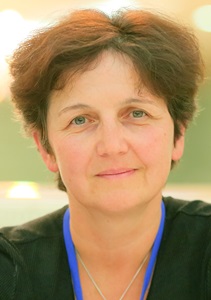Areas of interest
Maria’s research interests focus on climate change and variability and their impacts on glaciated environments and water resources. These interests fall into the following themes:
- Climate change and variability predominantly in the extratropical Eurasia and in mountains
- Mountain cryosphere, glacier change and climate-glacier interactions
- Impacts of climate change on water resources in glaciated catchments and arable agriculture downstream
- Water stable isotopes and their use in assessments of water resources
- Evolution of glacier lakes, glacier lake outbursts floods, and debris flows
- Meteorological forecasts for early warning and disaster risk management
- Impacts of light-absorbing impurities on snow and glacier melt with emphasis on desert dust
- Adaptation to climate change
Background
Maria is a climate scientist with a strong interest in mountain cryosphere. She has a combined BSc/MSc degree in Meteorology from Moscow State University (Russia) and DPhil in Climatology from the University of Oxford. She leads a wide programme of research on high-elevation climate and glacier change and their impacts on hazards and water resources. Most of her current work is conducted in Central Asia and High Mountain Asia and is based on the combined use of field measurements, modelling, and remote sensing. She works in close collaboration with many regional research institutions, universities and stakeholders including regional disaster risk reduction agencies. In 2022, she received the University of Reading Engagement and Impact Award for her work on modelling the development of glacier lakes in the Tien Shan.
Maria uses and develops stable water isotope techniques to study weather systems, and water resources in glacierized catchments. In 2019, she established the Central Asia Research and Adaptation Water Network (CARAWAN) specialising in isotope hydrology which operates in four Central Asian countries. She actively collaborates with the International Atomic Energy Agency (IAEA) and participates in the following IAEA projects: Understanding Hydrological Processes in Glacierized Catchments under Changing Climate using Isotope Techniques and Global Water Analysis Laboratory network (GLOWAL).
Maria leads a working group on Mountain Observatories at the Mountain Research Initiative (MRI), an international research network with over 11,000 global members. She helps coordinate the Central Asia Mountain Observatory Network (CAMON) and her team’s work at the Tuyuksu Mountain Observatory was featured in the New York Times. She is a member of the Third Pole Regional Climate Change Network (TPRCC), which was established by the WMO. She is a contributing author to the chapter on High Mountain Areas in the IPCC Special Report on the Ocean and Cryosphere in a Changing Climate (SROCC).
Panagiotopoulos, F., Shahgedanova, M. and Stephenson, D.B. (2002) A Review of Northern Hemisphere Winter-time Teleconnection Patterns. Journal de Physique IV France, 12: Pr 10-27 - Pr 10-47.
Shahgedanova, M. (2002) Air Pollution. In: The Physical Geography of Northern Eurasia: Russia and Neighbouring States. Shahgedanova, M (ed). Oxford University Press, Oxford, 476-496.
Shahgedanova, M. (2002) Climate at Present and in the Historical Past. In: The Physical Geography of Northern Eurasia: Russia and Neighbouring States. Shahgedanova, M. (Ed). Oxford University Press, 70-102.
Shahgedanova, M. 'Air Pollution' (2002). In: The Physical Geography of Northern Eurasia: Russia and Neighbouring States. Shahgedanova, M.(Ed). Oxford University Press. 476-496.
Shahgedanova, M., Perov, A and Mudrov, Y.. (2002) Mountains of Northern Russia. In: The Physical Geography of Northern Eurasia: Russia and Neighbouring States. Shahgedanova, M. (ed). Oxford University Press, Oxford, 284-313.
Shahgedanova, M., Mikhailov, V.N., Larin, S. and Bredikhin, A. (2002) Mountains of Southern Siberia. In: The Physical Geography of Northern Eurasia: Russia and Neighbouring States. Shahgedanova, M. (ed). Oxford University Press, Oxford, 314-349.
Shahgedanova, M. and Kuznetsov, M. (2002) The Arctic Environments. In: The Physical Geography of Northern Eurasia: Russia and Neighbouring States. Shahgedanova, M. (ed). Oxford University Press, Oxford, 191-217.
Shahgedanova, M. (ed) (2000) Contemporary Environmental Politics and Issues in Transitional Economies. Special Issue of Environment and Planning B, 27 (3).
Shahgedanova, M. (2000) Environment in Transition: Better or Different? Environment and Planning B, 27 (3): 325-330.
Shahgedanova, M., Burt, T.P. and T.D. Davies. (1999) 'Carbon Monoxide and Nitrogen Oxides Air Pollution in Moscow'. Water, Air and Soil Pollution, 112: 107-131.
Shahgedanova, M., Burt, T.P. and T.D. Davies (1998). Synoptic Climatology of Air Quality in Moscow. Theoretical and Applied Climatology, 61: 85-102.
Burt, T.P. and M. Shahgedanova (1998). 'An Historical Record of Evaporation Losses since 1815 Calculated Using Long-term Observations from the Radcliffe Meteorological Station, Oxford, England'. Journal of Hydrology, 205: 101-111.
Shahgedanova, M., Burt, T.P. and T.D. Davies (1997) Some Aspects of the Three-Dimensional Heat Island in Moscow. International Journal of Climatology, 17: 1451-1465.
Shahgedanova, M. and T.P. Burt (1994). 'New Data on Air Pollution in the Former USSR'. Global Environmental Change, 4 (3): 201-227.
Shahgedanova, M. and Burt, T.P (1993). 'Air Pollution Management in the Former USSR'. Perspectives on the Environment. J. Holder (Ed). Avebury, 167-179.
